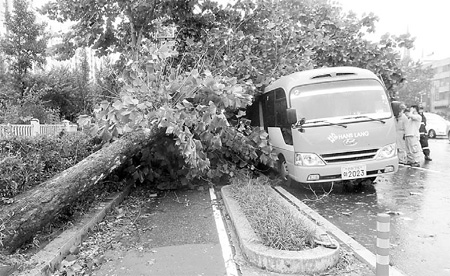Rare tropical storm system hits ROK
Typhoon Kompasu hammered the Republic of Korea (ROK) early Thursday, killing three people, while knocking over streetlights and scaffolding in what was called the strongest tropical storm to hit the Seoul area in 15 years.
 |
|
Rescue personnel and passersby check out a bus hit by a tree on a road in Incheon, in the Republic of Korea, on Thursday. |
The seventh typhoon of the year moved in from the East Sea in the morning, about four hours after making landfall on Ganghwa Island on the west coast before sweeping through the Seoul metropolitan area, ROK's Korea Meteorological Administration (KMA) sources said, according to the Yonhap News Agency.
The storm cut power to at least 130,000 homes in South Chungcheong and South Jeolla provinces and the southwestern city of Gwangju, the ROK's National Emergency Management Agency (NEMA) said.
A total of 128 domestic and international flights were canceled at airports nationwide, NEMA sources said, as quoted by Yohnap.
Service on two Seoul subway lines and five railway routes was also suspended, NEMA officials said.
The streets of Seoul were littered with broken tree leaves and branches and toppled construction materiel. Some parked cars were wrecked when scaffolding was knocked over by the typhoon.
An 80-year-old man died after being hit by a roof tile, and a 37-year-old businessman was killed on his way to work by a falling tree branch, NEMA said. A 75-year-old man, meanwhile, was electrocuted while examining a transformer, and four people were injured by flying glass.
Emergency rooms in Seoul's main hospitals were packed with people seeking first aid for their injuries.
Elementary and middle schools in the capital, Seoul, were ordered to delay the start of the school day by two hours, while all public and private kindergartens were closed for the day, the Seoul Metropolitan Office of Education said.
The storm, meanwhile, also caused at least 10 billion won ($8.3 million) in damage to a soccer stadium in Incheon, west of Seoul, stadium officials said.
Almost 150 ferry trips from Mokpo to Jeju island were suspended.
Agricultural damage is also estimated to be astronomical, as owners of rice paddies and pear, grape and apple farms along the west coastal areas reported extensive damage from the strong winds, according to Yohnap.
Citizens in the capital expressed outrage at government officials and the KMA, saying that state weather forecasters wrongly predicted that Typhoon Kompasu would bypass the ROK and instead reach landfall in the Democratic People's Republic of Korea (DPRK) to the north. By the time it was clear that the storm was going to hit Seoul, it did so about six hours earlier than forecast, Yohnap reports.
Parents in particular were angered, saying they were only informed of school delays at the last minute.
"I didn't receive a message from my daughter's school that her school start time would be delayed by two hours," said a parent in southern Seoul, "The (government) officials are very irresponsible."
Some students went to school not having received warnings before they left home.
The typhoon also caused torrential rains and heavy gusts throughout the DPRK, the country's state media reported Thursday.
Reports by the official KCNA News Agency, however did not say whether the typhoon caused any casualties or damages.
 0
0 






